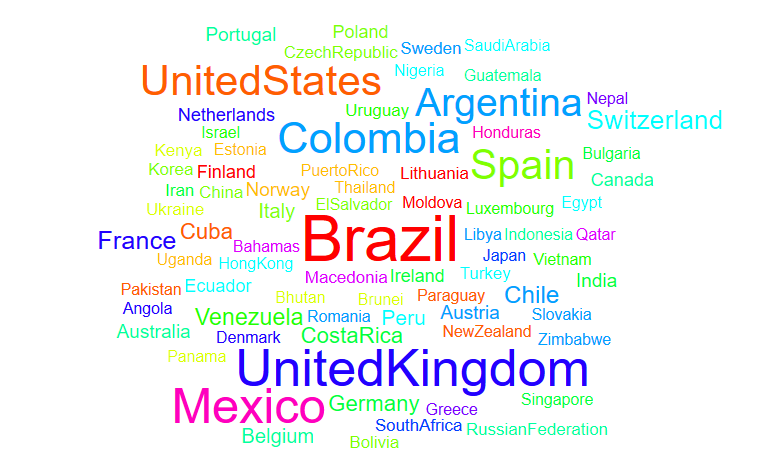DORA turns 6 years old this week. Or, as we like to say, this year DORA reached 14,000—that’s how many people have signed DORA, and they come from more than 100 countries! Each signature represents an individual committed to improving research assessment in their community, in their corner of the world. And 1,300 organizations in more than 75 countries, in signing DORA, have publicly committed to improving their practices in research evaluation and to encouraging positive change in research culture.

In honor of DORA’s 6th anniversary, we would like to highlight some of the progress being made in diverse research communities around the globe:
In Latin America, where 36% of our organizational signatories come from, several far-reaching scientific bodies have had an active role in reforming research assessment. In September, Redalyc, a platform of 1,308 scholarly journals in Latin America, the Caribbean, Spain and Portugal, mandated that the journals it indexes sign and adhere to DORA. Founder and CEO Eduardo Aguado-López & Executive Director Arianna Becerril-García clarified Redalyc’s position in a blog post. “For Redalyc it is important to base the value of a journal on its articles and contents and not on its impact based on citations; it is crucial that research results are assessed by its [sic] own merits and not by where they are published.“
After this public commitment and mandate emerged, we observed a surge in participation in DORA from organizations and individuals across Latin America. In January of this year, Redalyc partnered with Latindex and the Latin American Council of Social Sciences (CLACSO) to write a joint-letter reiterating their support for DORA and encouraging others to join.
Taking action on their public commitment to research assessment reform, representatives from CLASCO met with Conacyt, the Mexican National Council of Science and Technology, to plan a seminar to develop “guidelines that are in agreement with our social science disciplines and with our Latin American and Caribbean reality… and not only work with indicators that come, in many cases, from other scientific disciplines and other geographical realities,” said Karina Batthyány, Executive Secretary of CLACSO (translated from Spanish). We are looking forward to hearing about the outcomes of their ongoing discussions, and learning about indicators they identify as best suited to social sciences research and research culture in Latin America.
In France, the National Agency for Research (ANR) publicly encourages consideration of the quality and importance of all research outputs, including data sets, patents, and mediation actions. To improve their own selection practices, the ANR has established a training program for chairpersons involved in the Agency’s main call for project proposals. The ANR also pledges to follow DORA in establishing their methods of impact analysis and look to the Leiden Manifesto to guide them in selecting suitable quantitative indicators.
The Universitat Oberta de Catalunya (UOC) signed DORA thanks to the efforts of a task-force committed to seeing change. Reforming policies and practice takes time, and UOC is demonstrating their commitment to DORA by first revising their call for postdoctoral fellows. The task-force is now looking towards other institutional changes.
In Asia, the Indian National Government’s Department of Biotechnology, in collaboration with Wellcome Trust, established a cooperative funding mechanism to promote excellence in research across the country by providing fellowships to the brightest scholars. The Wellcome Trust/DBT India Alliance, as it is called, ultimately hopes to foster the development of the next generation of scientific leaders in India. In their evaluation processes, they focus on the profiles of the people they fund, because, as Shahid Jameel, CEO of the Alliance, puts it, “people are the most important thing in an institution. Hiring the right people and assessing them well should really be our priority.” Evaluation procedures should be designed to help selection committees identify the individuals with the skills, talents, and expertise best fit to whatever role for which they are being assessed.
In the United States, the American Society for Cellular Biology, is in the process of implementing selection procedures for awardees that adhere to the spirit of DORA, according to Sandra Schmid. She also points out that many scientific journals, such as “Molecular Biology of the Cell, Science, PLoS, eLife, and all American Society for Microbiology journals, are distancing themselves from their Journal Impact Factors, by no longer displaying these metrics on their websites.”
With our international community of signers, supporters, and campaigners, we are eager to support each of our many diverse communities in implementing similar changes. What do you envision for your country or your discipline? What has your institution done to reward scientists for diverse contributions to research? Reach out to us on twitter at @DORAssessment – we’d love to hear from you!
Helen Sitar is a Science Policy Programme Officer at EMBO, and Anna Hatch is the DORA Community Manager.
